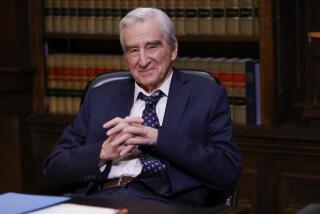Patrick McGoohan dies at 80; TV’s ‘Secret Agent’ and ‘Prisoner’
Patrick McGoohan, a two-time Emmy Award-winning actor who starred as a British spy in the 1960s TV series “Secret Agent” and gained cult status later in the decade as the star of the enigmatic series “The Prisoner,” has died. He was 80.
McGoohan, whose career involved stage, screen and TV, died Tuesday at St. John’s Health Center in Santa Monica after a short illness, said Cleve Landsberg, McGoohan’s son-in-law. The family did not provide further details.
It was the height of James Bond mania in 1965 when McGoohan showed up on American TV screens in “Secret Agent,” a British-produced series in which he played John Drake, a special security agent working as a spy for the British government.
The hourlong series, which ran on CBS until 1966, was an expanded version of “Danger Man,” a short-lived, half-hour series on CBS in 1961 in which McGoohan played the same character.
But it was McGoohan’s next British-produced series, “The Prisoner,” on CBS in 1968 and 1969, that became a cult classic that spawned fan clubs, conventions and college study.
Once described in The Times as an “espionage tale as crafted by Kafka,” “The Prisoner” starred McGoohan as a presumed British agent who, after resigning his top-security job, is abducted in London and taken to a mysterious prison resort called the Village.
Known only as No. 6, he is interrogated by a succession of officials who are known as No. 2. But he refuses all methods of breaking him down to reveal his past or why he resigned, and he repeatedly makes failed attempts to escape.
The seemingly idyllic village contains “seeing eyes” that monitor activities and signs such as “A Still Tongue Makes a Peaceful Life.”
McGoohan co-created and executive-produced the series, which ran for only 17 episodes, as well as wrote and directed several episodes.
In a 1967 interview with The Times, he described the series as “Brave New World” stuff.
“Nobody has a name, everyone wears a number,” he said. “It’s a reflection of the pressure on all of us today to be numbered, to give up our individualism. This is a contemporary subject, not science fiction. I hope these things will be recognized by the audience. It’s not meant to be subtle. It’s meant to say: This little village is our world.”
Of the enduring cult status of the series, McGoohan once said: “Mel [Gibson] will always be Mad Max, and me, I will always be a number.”
McGoohan, who reportedly turned down an offer to be the big screen’s original James Bond, appeared in films such as “The Three Lives of Thomasina,” “Mary, Queen of Scots,” “Silver Streak,” “Escape From Alcatraz,” “Scanners,” “Ice Station Zebra” and Gibson’s “Braveheart,” in which he played England’s sadistic King Edward I.
In his review of “Braveheart” in The Times, critic Peter Rainer wrote: “Patrick McGoohan is in possession of perhaps the most villainous enunciation in the history of acting.”
As a guest star on Peter Falk’s TV detective series “Columbo,” McGoohan won Emmys in 1975 and 1990.
Falk once described McGoohan, who also occasionally worked as a director and writer on the “Columbo” mysteries, as being “mesmerizing” as an actor.
“There are many very, very talented people in this business, but there are only a handful of genuinely original people,” Falk told the Hollywood Reporter in 2004. “I think Patrick McGoohan belongs in that small select group of truly original people.”
He was born to Irish parents in the Astoria section of Queens, N.Y., on March 19, 1928. Some months later, his family returned to Ireland, where he grew up on a farm before moving to Sheffield, England, when he was 7.
In the late ‘40s, after working a number of jobs, he became a stage manager at Sheffield Repertory Theatre, where he soon launched his acting career.
In 1951, he married actress Joan Drummond, with whom he had three daughters, Catherine, Anne and Frances.
In 1959, he received a London Drama Critics Award for his performance in a London stage production of Ibsen’s “Brand.”
On television, McGoohan also starred in the short-lived 1977 medical drama “Rafferty.”
Sharif Ali, McGoohan’s agent, said McGoohan had been writing and had two acting offers on the table before he died.
“He really didn’t talk much about his illness,” said Ali. “We were too busy talking about his future; he was excited to get back to work. He had so much more to give.”
In addition to his wife and daughters, McGoohan is survived by five grandchildren and a great-grandson.
More to Read
Start your day right
Sign up for Essential California for the L.A. Times biggest news, features and recommendations in your inbox six days a week.
You may occasionally receive promotional content from the Los Angeles Times.






